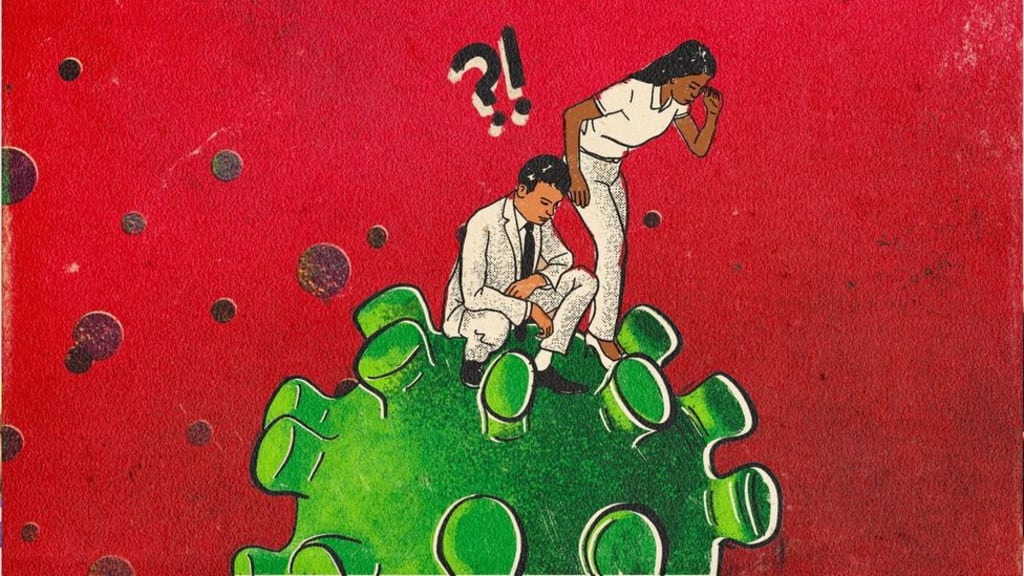The Pandemic's Impact on Mental Health: Exploring Anxiety and Depression Rates in the US
Understanding the Causes and Addressing the Consequences of the COVID-19 Pandemic on Mental Health

The COVID-19 pandemic has had a profound impact on people's lives across the world. The United States is one of the countries that has been hit hardest by the virus, with millions of people testing positive and hundreds of thousands of deaths. While the physical effects of the virus are well-documented, the pandemic has also had a significant impact on people's mental health. Anxiety and depression rates have skyrocketed over the past two years, and it is important to understand the reasons behind this trend and how to address it.
Before the pandemic, anxiety and depression rates in the United States were already high. According to the National Institute of Mental Health, in 2019, an estimated 19.4 million adults (or 7.7% of the US population) had experienced at least one major depressive episode in the past year, and an estimated 31.1% of adults had experienced an anxiety disorder at some point in their lifetime. However, the pandemic has exacerbated these conditions in many ways.
One of the most significant reasons for the increase in anxiety and depression rates is the isolation and social distancing measures that have been put in place to slow the spread of the virus. Many people have been forced to work from home or lost their jobs, leading to a sense of loneliness and isolation. This has been particularly hard for those who live alone, as they may have little or no contact with other people for long periods. In addition, many people have had to cancel social events and gatherings that they were looking forward to, such as weddings, birthdays, and vacations. This has led to a sense of disappointment and loss, which can contribute to anxiety and depression.
Another factor that has contributed to the increase in anxiety and depression rates is the constant stream of news and information about the virus. While it is important to stay informed, many people have found it difficult to cope with the constant barrage of bad news. The 24-hour news cycle, social media, and other forms of media have made it difficult for people to switch off and take a break from the stress and anxiety.
Furthermore, the pandemic has led to a significant increase in financial insecurity for many people. Millions of people have lost their jobs, and many businesses have closed down permanently. This has led to a sense of uncertainty and worry about the future, which can contribute to anxiety and depression. Even for those who have kept their jobs, the economic impact of the pandemic has meant that many people are struggling to make ends meet and are facing financial hardship.
The pandemic has also had a significant impact on children and teenagers, who have been forced to adapt to remote learning and disrupted routines. Many young people have experienced feelings of isolation and disconnection from their peers, which can contribute to anxiety and depression. Additionally, young people may be struggling to cope with the uncertainty and unpredictability of the situation, which can lead to feelings of anxiety and distress.
It is clear that the pandemic has had a profound impact on people's mental health, but there are steps that can be taken to address this issue. The first step is to recognize the problem and to seek help if you are struggling with anxiety or depression. Many mental health organizations and hotlines are available to provide support and guidance to those who are struggling.
In addition, it is important to maintain a healthy routine and to engage in self-care activities that can help to reduce stress and anxiety. This may include activities such as exercise, meditation, or spending time in nature. It is also important to stay connected with loved ones and to reach out for support if you are feeling overwhelmed or isolated.
Finally, policymakers and healthcare professionals need to recognize the importance of mental health and to provide resources and support to those who are struggling. This may include funding for mental health services, as well as initiatives to address the social and economic factors that contribute to anxiety and depression, such as unemployment and financial insecurity.
One promising development in the field of mental health is the increased use of teletherapy and other digital resources. With the pandemic making in-person therapy difficult or impossible, many mental health professionals have turned to online counseling and other digital resources to provide support to those who need it. This has made mental health services more accessible to people who may not have been able to access them otherwise, such as those who live in rural areas or who have mobility issues.
However, there are also challenges associated with the increased use of digital mental health resources. For example, not everyone has access to high-speed internet or the technology required to participate in online counseling. Additionally, some people may prefer in-person counseling or may find it difficult to open up to a therapist through a digital platform.
Ultimately, addressing the increase in anxiety and depression rates in the US will require a multi-faceted approach that addresses both the individual and societal factors that contribute to mental health issues. It is important for policymakers, healthcare professionals, and individuals alike to recognize the importance of mental health and to work together to provide support and resources to those who are struggling. Only by working together can we ensure that everyone has the resources and support they need to thrive, even in the midst of a global pandemic.





Comments
There are no comments for this story
Be the first to respond and start the conversation.